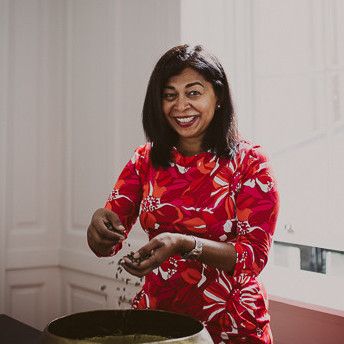My mother’s experience made me aware of menopause. She was one of those women who didn’t want to talk about it too much - but she did explain to the family a bit. She ended up taking HRT. But that was really my only experience of menopause before I started the transition. I didn’t speak to anyone at work or anything like that.
When I think about it now, I was in my early 40s when the symptoms started. Essentially I felt really dehydrated. I used to go to the gym a lot, and after a full workout I would sit down for breakfast and feel terrible. I would get this migraine which would last for 24 hours. At that time, the only thing I could think was that I was dehydrated or that my blood sugar had dropped really low. So I would eat lots of chocolate (of course)!
Just after my symptoms began I changed my job - from finance to setting up my own business. I noticed that with the stress of this change my symptoms got a lot worse. I was having these episodes far more frequently. Migraines, nausea and stomach issues could last up to 48 hours. By my early 40s my periods had also completely stopped.
I did manage to help myself with the migraines. I started to track my symptoms, and log the triggers. I thought if it was just dehydration I could cure it. I now drink a lot more water each day, and this has helped. Sometimes my migraines are triggered by stress - but overall it’s been a lot more manageable with time.
The joint pain (which no one ever talks about) is terrible! I used to exercise a lot (boxing, kickboxing, climbing), and have had some joint pain in the past so I was told the pain was probably due to this. I didn’t know that it could be to do with perimenopause or hormone changes. Now I’ve drastically reduced my exercise - gone from one extreme to the other. I do strength training though and this has really helped with the knee and hip pain. I can be sitting for a long time day to day. So strength training really helps. I still get symptoms with my menopause but have found ways to manage the journey.
As I move into the post-menopause phase of life I have found myself reflecting how many opportunities there were - personally and professionally. I had a great routine of exercise and work. Now, there’s no real routine. I struggle to fit exercise into my life like I used to. I generally feel good, eat well and move enough. But on the days when I don’t, and I treat myself, there’s a lot more guilt than there used to be. I think about these choices a lot more than I ever did when I was younger, and that can be hard to cope with.
The career shift into entrepreneurship that came alongside my peri-menopause symptoms has been empowering. I believe that the majority of people end up choosing their careers based on what their family is exposed to - for me that was finance. My dad was an accountant and both me and my sister chose that path. But I never really enjoyed my role in banking - being a cog in a big machine. Nothing creative about banking. So I quit!
I’m Sri Lankan and had always wanted to work with Ceylon tea. Original plan was to set up a little tea house. I took a course at the Cordon Bleu (it was amazing) and set up my tea shop. The rents and costs were just far too high though. So I pivoted - and did a lot of farmers markets. This was amazing, as I got to speak directly to the customers. Gradually - the tea took over from the cakes on the stall. I used to blend the tea at home, but I moved it to a factory in Kent to scale up the business. I then launched the [tea online](https://missteasmith.com/) last year. And I’ve now set myself up as an artisan tea business - serving other businesses (cafes, co-working spaces etc) and couldn’t be happier. The challenge for me now is selling the concept of tea, and high quality tea, into businesses.
I never felt that my journey or my menopause symptoms held back my career. And that’s a real blessing (and I know not the case for many women). I really do believe we need more education on menopause - especially the duration. In particular, we women need to know what’s happening when it starts and how to manage symptoms whether we choose medication or not.

